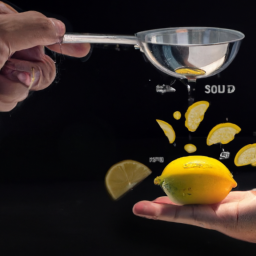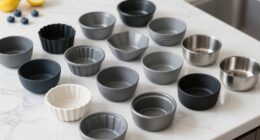In the world of culinary arts, especially in cooking and baking, lemons are essential. They are versatile, adding a touch of acidity to dishes or creating a refreshing drink. However, a common question that often arises is how much juice can be squeezed from one lemon.
As a seasoned cook and baker, I have spent countless hours juicing lemons and have learned a thing or two about the process. First and foremost, it’s important to understand that the amount of juice in a lemon can vary. Factors such as the size of the lemon, its ripeness, and even the time of year can all impact the amount of juice a lemon contains.
So while it’s helpful to have a general idea of how much juice you can expect from a lemon, it’s important to be flexible and adjust your measurements as needed. In this article, I’ll share some tips and tricks for getting the most juice out of your lemons, as well as provide some insight into how much juice you can typically expect to get from one lemon.
Key Takeaways
- The average amount of lemon juice in one lemon is 2-3 tablespoons depending on size and ripeness.
- Rolling the lemon on a hard surface before cutting and juicing breaks down the lemon’s internal structure, making it easier to release the juice.
- Lemons should be at room temperature before juicing for easier extraction.
- Sourcing lemons and squeezing them yourself ensures the freshest and most nutritious juice possible.
Understanding Lemon Juice Content
So, if you’re wondering how much lemon juice to squeeze for a recipe, one lemon typically yields around 2-3 tablespoons of juice. However, this can vary depending on the size and ripeness of the lemon. You can also get more juice by rolling the lemon on a hard surface before cutting it open and juicing it.
Lemon juice has many benefits, including aiding in digestion, boosting the immune system, and promoting healthy skin. But what if you don’t have a lemon on hand or want to try something different?
Some substitutes for lemon juice include lime juice, vinegar, and white wine.
Now, let’s move on to the different methods of juicing a lemon.
The Different Methods of Juicing a Lemon
When life gives you lemons, there are different ways to juice them. One of the easiest methods is by using a handheld juicer. This tool is efficient in extracting the juice from the lemon without much effort. Simply cut the lemon in half, place it in the juicer, and press down on the handles. The juicer will filter out the seeds and pulp, leaving you with pure lemon juice ready to be used.
Another method of juicing a lemon is by giving it a good roll and pressing with the heel of your hand. This technique is often used by bakers and chefs who need small amounts of lemon juice. A good roll on a hard surface will break down the lemon’s fibers and make the juice flow more easily. Then, simply cut the lemon in half, hold it over a bowl, and press down on the lemon with the heel of your hand. This will extract the juice from the lemon, which you can then strain to remove the seeds and pulp.
Lemon juice benefits are numerous, from aiding digestion to boosting immunity and promoting clear skin. It’s a versatile ingredient that can be used in many recipes, from salad dressings to marinades, sauces, and desserts. Knowing how to juice a lemon properly is essential to get the most out of this citrus fruit.
Now, let’s move on to the next section and learn more about squeezing lemons by hand.
Squeezing Lemons by Hand
You can easily squeeze fresh lemon juice by hand with just a few simple steps. Hand squeezing techniques are a great way to get the most juice out of your lemons. Plus, it’s a simple and cost-effective way to get the job done.
To begin, start by rolling the lemon back and forth on a hard surface. This will help to loosen up the juices inside the lemon. Then, cut the lemon in half crosswise. Hold the lemon half over a bowl or measuring cup with the cut side facing down. Squeeze the lemon with your hand, applying firm pressure to get all of the juice out. Repeat with the other half of the lemon.
Using a strainer can also be beneficial when hand squeezing lemons. It helps to remove any pulp or seeds that may have fallen into the juice. This ensures that your lemon juice is smooth and free of any unwanted bits. Once you have finished hand squeezing your lemons, you can move on to using a citrus juicer for a more efficient method of juicing.
Using a Citrus Juicer
Using a citrus juicer is a quick and efficient way to extract the maximum amount of juice from a lemon. Not only does it save time, but some models are capable of extracting up to 95% of the fruit’s juice.
The benefits of lemon juice are well-known and it’s a versatile ingredient that can be used in a variety of recipes, from salad dressings to lemonade. Incorporating lemon juice into your diet can help boost your immune system, aid digestion, and even improve your skin. It’s also a popular ingredient in many detox and weight loss plans.
Recipes using lemon juice are endless and can range from sweet to savory dishes. Whether you’re making a lemon meringue pie or adding a splash of lemon juice to your grilled fish, using a citrus juicer ensures that you’re getting the most juice possible.
Speaking of juicing, let’s move on to using an electric juicer.
Using an Electric Juicer
I’ve been using electric juicers for years now, and there are a few things I’ve learned along the way.
First of all, there are different types of electric juicers out there, and each one has its own strengths and weaknesses.
From centrifugal juicers to masticating juicers, it’s important to choose the right one for your needs.
Once you’ve got your juicer, it’s also important to know how to use it properly in order to get the most juice from your fruits and vegetables.
Types of Electric Juicers
There are various types of electric juicers available on the market for extracting juice from lemons, each with its own advantages and disadvantages. Citrus fruit varieties, such as lemons, require a juicer that can effectively extract the juice without leaving any seeds or pulp behind.
The most common types of electric juicers for citrus fruits are the reamer, the centrifugal juicer, and the masticating juicer. A reamer juicer is a simple and affordable option that works by manually twisting the lemon onto a pointed cone, which presses the juice out of the fruit.
Centrifugal juicers, on the other hand, use a spinning blade to shred the fruit and extract the juice, which is then separated from the pulp and seeds. Masticating juicers are the most expensive option, but they also offer the highest yield and nutritional value. These juicers use a slow and steady process to crush and squeeze the fruit, resulting in a higher quality juice with minimal pulp and seeds.
Now that we know about the different types of juicers, let’s move on to how to use them to extract the maximum amount of juice from our lemons.
How to Use an Electric Juicer
Congratulations, you’ve purchased an electric juicer and you’re ready to embark on the journey of extracting every last drop of liquid gold from your citrus fruits. Using an electric juicer can be a game changer for anyone who loves freshly squeezed juice.
Here are some tips to help you get the most out of your new appliance:
-
Cleaning and maintenance: Make sure to clean your juicer thoroughly after each use. Most electric juicers have removable parts that can be washed in the dishwasher or by hand. Be sure to read the manufacturer’s instructions for specific cleaning recommendations.
-
Regular maintenance: It’s important to keep your juicer in top working condition. Check the blades and other components regularly to make sure they are in good shape.
-
Finding the perfect juicing consistency: Experiment with different fruits and vegetables to find the perfect juicing consistency. For citrus fruits like lemons, you’ll want to remove the rind and any seeds before juicing. Cut the fruit into small pieces and feed them into the juicer one at a time. If you prefer a pulp-free juice, strain the juice through a fine mesh strainer or cheesecloth.
-
Avoid overloading the juicer: It’s best to feed the fruit into the juicer slowly to avoid overloading the machine. This can cause the juicer to clog or even break. Start with small pieces of fruit and gradually increase the amount as you become more comfortable using the appliance.
Now that you know how to use your electric juicer, let’s move on to the next step: measuring the lemon juice.
How to Measure Lemon Juice
You can easily measure lemon juice by cutting a lemon in half and squeezing it until all the juice is out, yielding approximately 2-3 tablespoons of juice per lemon. It’s important to note that the amount of juice can vary depending on the size and ripeness of the lemon.
If you need a more precise measurement, you can use a juicer tool or a handheld citrus squeezer. These tools will help you extract every last drop of juice, ensuring measuring accuracy.
When it comes to conversion factors, keep in mind that 1 lemon typically yields about 2-3 tablespoons of juice, which is equivalent to 1 fl oz or 30 mL. This information can be useful when you’re working with recipes that call for a certain amount of lemon juice or when you need to substitute fresh lemon juice for bottled lemon juice.
Knowing the average amount of lemon juice in one lemon can also help you plan ahead and make sure you have enough lemons on hand for your cooking or baking needs.
The Average Amount of Lemon Juice in One Lemon
If you’re wondering how to plan for your next recipe, it’s helpful to know that the average amount of tangy, citrus liquid squeezed from a single lemon can range from 2-3 tablespoons depending on its size and ripeness.
This is a useful measurement to keep in mind when planning recipes that require lemon juice as an ingredient. Not only does lemon juice add a bright, zesty flavor to dishes, but it also has a number of health benefits. Lemon juice is rich in vitamin C, antioxidants, and other nutrients that can boost the immune system and promote overall health.
In addition to its nutrition benefits, lemon juice is also a versatile ingredient that can be used in a variety of recipes, from salad dressings to marinades. If you’re looking to get the most juice out of your lemons, there are a few tips and tricks that can help. By rolling the lemon on a hard surface before cutting it in half, using a fork to loosen the flesh, and microwaving it for a few seconds, you can extract more juice from each lemon.
These simple steps can help you get the most out of this flavorful and nutritious ingredient.
Tips for Getting More Juice Out of Lemons
To maximize the tangy flavor of your dishes, try these simple tips for extracting every last drop of lemony goodness from your citrus fruits.
First and foremost, always make sure your lemons are at room temperature before juicing. This helps to loosen up the membranes inside the lemon, allowing for easier extraction of the juice.
To further maximize juice extraction, roll your lemon on a hard surface before cutting and juicing. This breaks down the lemon’s internal structure, making it easier to release the juice.
Aside from being a delicious addition to food and drinks, there are also numerous benefits of lemon juice. For instance, lemon juice is a natural source of vitamin C, which is essential for maintaining a healthy immune system. Additionally, lemon juice is often used in skin care due to its antibacterial and antifungal properties.
With all these benefits, it’s no wonder that lemon juice is a staple in many households.
So, now that you know how to get the most juice out of your lemons and the benefits of lemon juice, let’s explore alternative sources of lemon juice.
Alternative Sources of Lemon Juice
Hey, feeling lazy to squeeze lemons? Don’t worry, there are some convenient options available for getting that zesty flavor without all the hassle.
Here are some alternative sources of lemon juice that you can consider:
-
Lemon juice concentrate: This is a concentrated form of lemon juice that you can find in most grocery stores. It’s made by removing the water from freshly squeezed lemon juice, which makes it easier to store and use. While it may not have the same fresh taste as freshly squeezed lemon juice, it’s still a good source of vitamin C and can be used in a variety of recipes.
-
Bottled lemon juice: This is another convenient option that you can find in most grocery stores. It’s made by extracting the juice from fresh lemons and bottling it. While it may not have the same fresh taste as freshly squeezed lemon juice, it’s still a good source of vitamin C and can be used in a variety of recipes. However, it’s important to check the label to make sure that it doesn’t contain any additives or preservatives that may affect its quality.
While these alternatives may be convenient, there’s no substitute for the taste and benefits of fresh lemon juice. Sourcing lemons and squeezing them yourself ensures that you’re getting the freshest and most nutritious juice possible.
Fresh lemon juice is a good source of vitamin C, antioxidants, and other nutrients that are important for maintaining good health. So, if you have the time and energy, consider squeezing your own lemons to get the most out of this citrus fruit.
Frequently Asked Questions
Can lemon juice be substituted with lime juice in a recipe?
Yes, lime juice can be substituted for lemon juice in a recipe for a different flavor profile. However, lemon juice has unique benefits for skin due to its high vitamin C content.
How long does freshly squeezed lemon juice last in the fridge?
I recently made a batch of lemonade and had leftover freshly squeezed lemon juice. To extend its shelf life, I stored it in an airtight container and placed it in the fridge. Leftover lemon juice can be used in marinades or salad dressings. Tips for storing freshly squeezed lemon juice include using a glass container, adding a layer of plastic wrap on top, and labeling it with the date. It can last for up to a week in the fridge if stored properly.
Does the size of the lemon affect the amount of juice it produces?
As someone with experience in cooking and using lemons, I can confidently say that the size and variety of a lemon can affect its juice yield. Some varieties are naturally juicier than others, while larger lemons typically produce more juice than smaller ones.
Is it necessary to remove the seeds from the lemon before juicing?
As a seasoned juicer, I can confidently say that removing lemon seeds is crucial for optimal taste. The seeds can make the juice bitter. Trust me, it’s worth the extra effort for a smoother sip.
Can lemon juice be used for cleaning and disinfecting surfaces?
Yes, lemon juice can be used for cleaning and disinfecting surfaces. Its acidic properties make it effective in breaking down bacteria and grime. Dilute with water and apply to surfaces for optimal results.
Conclusion
In conclusion, understanding the content of lemon juice is crucial in cooking and baking. The different methods of juicing a lemon can affect the amount of juice extracted. Squeezing by hand, using a citrus juicer, or an electric juicer are all viable options. To measure lemon juice accurately, use a measuring cup or a kitchen scale.
On average, one lemon contains about 2 tablespoons of juice. However, the amount of juice can vary depending on the size and ripeness of the lemon. To get more juice out of lemons, roll them on a hard surface, microwave them for a few seconds, or poke them with a fork before juicing.
If fresh lemons are not available, bottled lemon juice or other citrus juices can be used as an alternative source. With these tips, you can confidently use lemon juice in your recipes and enjoy the bright and tangy flavor it adds to your dishes.









